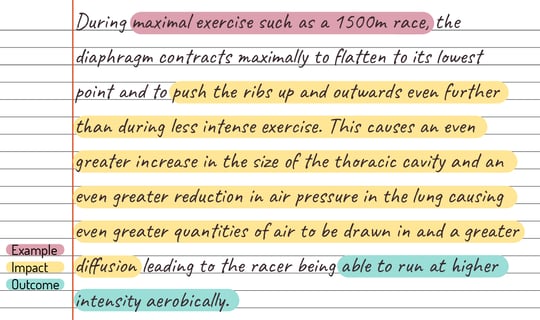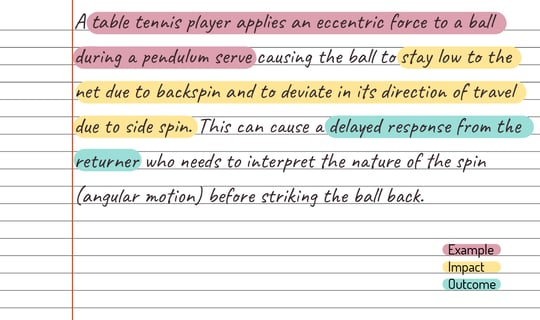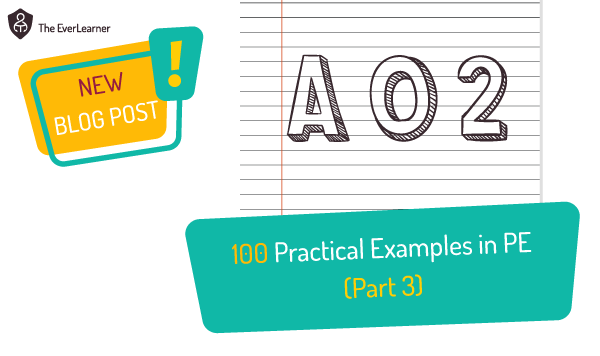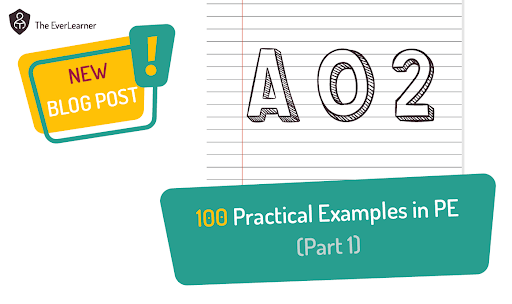Welcome to part two of this blog post series focused on (AO2) practical examples in PE exam answers. This week’s post includes 15 well developed practical examples starting with the letters D, E and F. This post is a follow-up to part 1, which was posted a few weeks ago, covering (AO2) examples starting with A, B and C.
My aim with this post is to set a standard for how examples are written in PE exams but also to support teachers in providing the best explanations of theories and concepts through examples during their teaching.
I advocate for the E-I-O method of making examples. That is to say that the best examples that teachers and students can make cover:

Using two of the examples from this post, we can emphasise E-I-O:

...and another...

In each of the two examples above it is clear that the learner is explicitly applying their example to the impact on that performance and the outcome of that performance.
As a word of caution, I want to remind readers that some examples will only have either impact or outcome or, more precisely, the impact and the outcome will be the same thing.
D
Diaphragm
During maximal exercise such as a 1500m race, the diaphragm contracts maximally and flattens to its lowest point and it pushes the ribs up and outwards even further than during less intense exercise. This causes an even greater increase in the size of the thoracic cavity and an even greater reduction in air pressure in the lung, causing even greater quantities of air to be drawn in and a greater diffusion leading to the racer being able to run at higher intensity aerobically.
D
Dislocation
During a fall from the horse in a cross-country equestrian event, the humeral head may dislocate from the scapula socket if the surrounding ligaments are not robust enough to resist the impact. This will cause the rider a great deal of pain and they will not be able to continue in the competition.
D
Discrimination
Discrimination occurs in association football if a coach allocates a black player to a position based on speed and power, such as the wing position, and a white player to a position of decision-making and organisation such as a goalkeeper without sufficient assessment of their skills. This can result in the over-representation of certain ethnicities in certain roles in a team and is known as stacking.
D
Dominant response
The dominant response of a novice basketballer is a high tendency for errors when passing the ball. The presence of an audience, especially a judgmental audience, increases the arousal of the performers and, according to Hull’s drive theory, the tendency for the dominant response increases. In the case of our novice basketballer, greater numbers of passing errors are likely to ensue, as this is the dominant response.
D
Dynamic stretching
Dynamic stretching involves the lengthening of the hamstring group when performing forward leg kicks until the hamstrings apply a stretch reflex to resist the movement during a warm-up by a number 10 in rugby union. This causes an increase in the extensibility of the hamstring group of the player and a greater follow-through during penalty kicks and conversion attempts.
E
Eccentric contraction
In the lowering phase of a pull-up, the biceps (brachii) contracts eccentrically as it lengthens whilst remaining under tension. The biceps (brachii) is the agonist and is performing work as the “brake” and causing the performer to lower themselves to the bottom position rather than falling.
E
Eccentric force
A table tennis player applies an eccentric force to a ball during a pendulum serve causing the ball to stay low to the net due to backspin and to deviate in its direction of travel due to side spin. This can cause a delayed response from the returner, who needs to interpret the nature of the spin (angular motion) before striking the ball back.
E
Elastic strength
A 100m sprinter displays elastic strength in the first 10m of their race as they rapidly transition from a stationary sprint start position to a more upright and accelerating position. This is achieved through the application of maximal force at high speed to the block and, subsequently, the track surface and causes maximal acceleration for the runner.
E
Energy balance
A male elite endurance swimmer achieves an energy balance by consuming far more than the average of 2,500kcal per day. The additional fuel, often taken in the form of carbohydrate, provides energy release for the training regime that the swimmer must follow. Otherwise, the swimmer would lack sufficient energy for training and would need to consume fat reserves to power their activity.
E
Error detection
Error detection occurs when a swimming coach uses a whole-part-whole practice structure. The breaststroke skill is performed as a whole and the coach is able to identify errors in the individual subroutine of the leg kick before practising that subroutine in isolation. The whole breaststroke is then practised again and the coach confirms that the error in the leg kick has been corrected.
F
Fast glycolytic muscle fibre
FG fibres in the gastrocnemius are useful to a high jumper at the point of take-off, as they are capable of applying a very large force and speed of contraction. This increases the outgoing velocity of the high jumper and causes their peak vertical displacement to be greater, thus causing them to clear the bar.
F
First-class lever
Elbow extension during the execution phase of a javelin throw is a first-class lever system because the fulcrum of the elbow joint lies between the insertion of the triceps (brachii) on the point of the ulna (the effort) and the weight of the javelin (the load).
F
Frontal plane
A goalkeeper's diving save to their left is movement along the frontal plane, as the player needs to perform abduction at their shoulders, as well as adduction at their hips in order to propel their body left and stop the ball with their outstretched arms and hands.
F
Favourableness
Favourableness, from Fiedler’s contingency model, occurs in a taekwondo team when the position of the head coach is well established and respected, when the coach has warm and functional relationships with the performers and when the task that the team is facing—such as to achieve at least three medals at an Olympics games—is clear to all.
F
Fixed practice
A basketball player uses fixed practice when performing free throws from the foul line. The player performs the skill in the same way, over and over, without any defenders or external influence, as this is how the free throw will be performed in the game.
Thank you for reading this week's post. I hope you have found it insightful. I truly believe that with tweaks to current practice, like those highlighted in this post, the cohorts of examined PE students can score far higher in examined and coursework elements. Whether you agree or disagree, I would be grateful of your comments below.
Have a great day.



%20Text%20(Violet).png)

